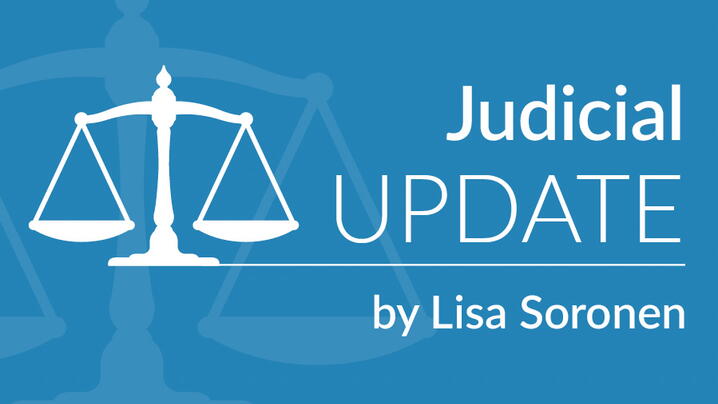
by Lisa Soronen, executive director, State and Local Legal Center
State and local governments who have sued the Trump administration over the sanctuary jurisdictions executive order, the adding of conditions to receive Edward Byrne Justice Assistance Grants (Byrne JAG), and the provision of documentation to prove they comply with 8 U.S.C. 1373 have won all their major claims except one as of June 5.
On June 6, in City of Philadelphia v. Sessions, a federal district court became the first to rule that Section 1373 is unconstitutional. This statute prohibits state and local governments from restricting employees from sharing immigration status information with federal immigration officials.
Byrne JAG provides “flexible” funding for state and local police departments. In April 2017, the Department of Justice (DOJ) required Philadelphia (and eight other jurisdictions) to provide documentation that complies with Section 1373 to receive funding.
Philadelphia sued Attorney General Jeff Sessions arguing, among other things, that Section 1373 was unconstitutional as it was being interpreted by DOJ. The district court agreed and granted Philadelphia a permanent injunction.
In May 2018, in Murphy v. National Collegiate Athletic Association, the Supreme Court declared the federal Professional and Amateur Sports Protection Act (PASPA) unconstitutional because it violates the Tenth Amendment anticommandeering doctrine. PASPA prohibited states from authorizing sports gambling. According to the Supreme Court, PASPA’s prohibition violated the anticommandeering doctrine because it “unequivocally dictate[d] what a state legislature may and may not do.”
The district court, in this case, reasoned that the federal restrictions on state and local governments under Section 1373 are similar to the federal restrictions on state-authorized sports gambling. “8 U.S.C. §§ 1373(a) and 1373(b) by their plain terms prevent ‘Federal, State, or local government entit[ies] or official[s] from’ engaging in certain activities. These provisions closely parallel the anti-authorization condition in PASPA, which was at issue in Murphy.”
Assuming that Section 1373 is constitutional, the court came to two alternative conclusions.
In July 2017, DOJ added a “notice” and an “access” requirement to receive Byrne JAG funds. Recipients were required to (1) provide 48 hours advance notice to the federal government regarding the scheduled release of “aliens” and (2) allow access to local jails so federal agents could meet with “aliens” and inquire about their right to be in the United States.
Sessions argued that Section 1373 requires the city to provide advance notice of release of “aliens” from city custody. The court disagreed noting that “the language [of 1373] is entirely silent on the obligations of local correctional facilities and nowhere mentions any requirement to provide advance notice of release for a non-citizen.”
The court also concluded that the city “substantially complies” with any obligations under Section 1373 to transfer “criminal aliens” to ICE custody. A “criminal alien” who is about to be released from a local jail may be detained pending removal per federal law; however, the city is legally required to release anyone who has completed their sentence. Philadelphia agreed if Immigration and Customs Enforcement (ICE) secures a “judicial warrant,” with a judicial signature (not an ICE judge), the city will facilitate the transfer of custody of “criminal aliens” to ICE.
The court rejected Sessions’ rejection of Philadelphia’s agreement: “[Sessions] fails to provide any reason why the Attorney General, or the local U.S. Attorney, and the Secretary of DHS, or a local ICE official, cannot adopt, very quickly, changes in current procedures to show that an individual in City prisons qualifies as a criminal alien under federal law, thereby showing that ICE is entitled to take custody of that person upon their release from City custody. This procedure could then be used in circumstances in which the United States Attorney’s Office seeks a judicial order that the individual is taken into custody by ICE upon release from the City prison.”
While this ruling only applies to the city of Philadelphia, other judges who are considering the constitutionality of Section 1373 might find it persuasive.
Related Content
Legal Theories for Sanctuary Cities. This article from 2017 looks at what the potential legal options were for state and local governments when dealing with the Trump administration's actions to curb sanctuary cities.
Trump Administration Sues California over Sanctuary Laws. In a 2018 blog post, Lisa Soronen explains why the Trump administration sued the state of California over its sanctuary laws.
Appeals Court Affirms Decision in Chicago Sanctuary Jurisdictions Case. In another 2018 blog post, the focus is on a case involving Byrne grants.
New, Reduced Membership Dues
A new, reduced dues rate is available for CAOs/ACAOs, along with additional discounts for those in smaller communities, has been implemented. Learn more and be sure to join or renew today!
